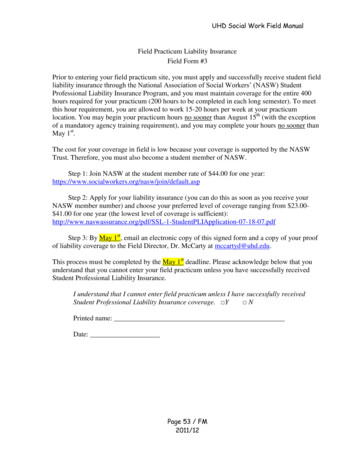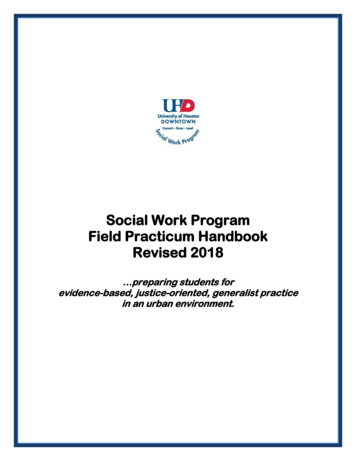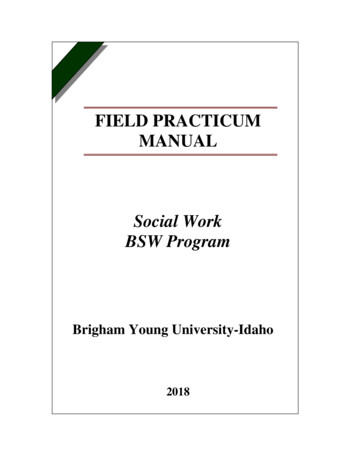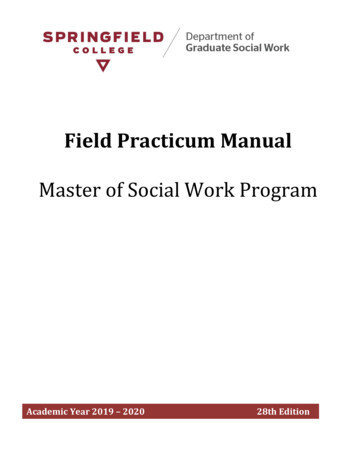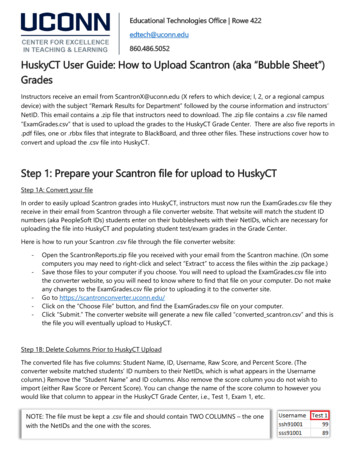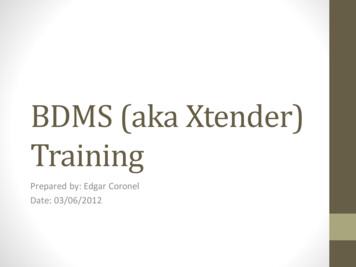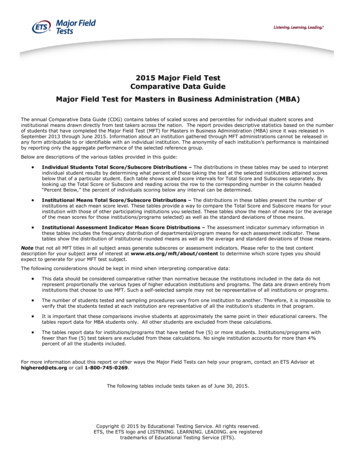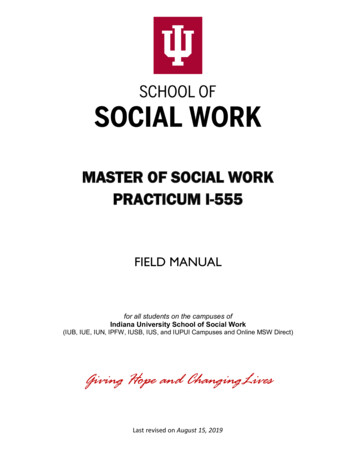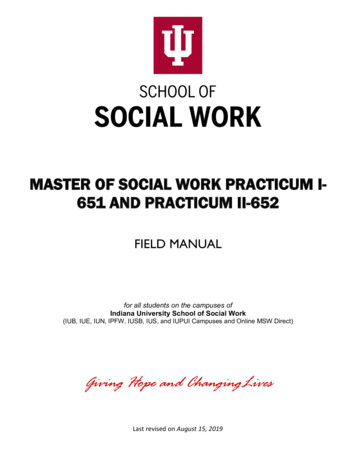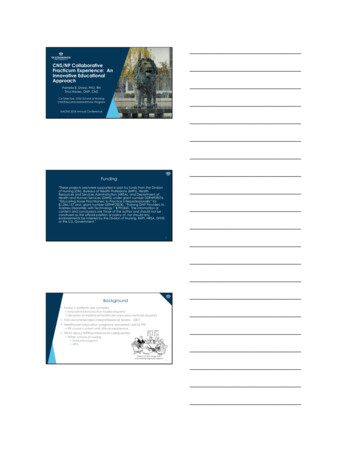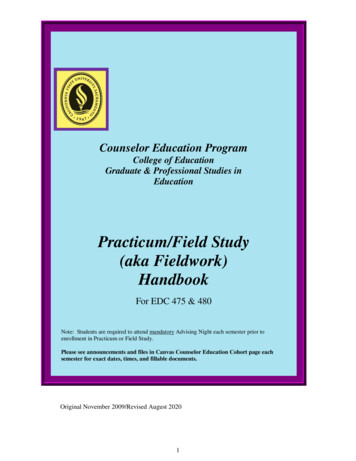
Transcription
Counselor Education ProgramCollege of EducationGraduate & Professional Studies inEducationPracticum/Field Study(aka Fieldwork)HandbookFor EDC 475 & 480Note: Students are required to attend mandatory Advising Night each semester prior toenrollment in Practicum or Field Study.Please see announcements and files in Canvas Counselor Education Cohort page eachsemester for exact dates, times, and fillable documents.Original November 2009/Revised August 20201
Change RecordAugust 2020 Revision; replaces prior issues2
TABLE OF CONTENTSIntroduction . 4Faculty. 4The Center for Counseling and Diagnostic Services (CCDS) . 5Responsibilities of Practicum & Field Study Students . 6Consent/Confidentiality . 7Professional Behavior Expectations . 7Probation and Dismissal of Students from the Counselor Education Program . 8Dispositions: . 9Roles and Responsibilities for Practicum & Field Study. 9Students Responsibilities. 9University Supervisor Responsibilities . 10Site Supervisors Responsibilities . 10For Off-Site Placements: Site Supervisor Responsibilities Continued . 11Practicum/Field Study Coordinator & Specialty Coordinator Responsibilities . 11Hours Defined. 12EDC 475 Practicum Overview. 14EDC 480 Field Study Overview. 18Field Study Sites . 27BBS Supervisor Qualifications . 28Supervision . 29Supervisor Qualifications . 29The Supervisory Relationship Defined . 29Consultant . 30State Level Licensing . 32Consent for Discussing or Recording Counseling Sessions. 403
IntroductionThis document describes the practicum and field study training requirements for the Master of Science inCounseling program, inclusive of all specializations/concentrations (Career; MCFC; Rehabilitation; and School).It includes the procedures for applying for Practicum (EDC 475) and Field Study (EDC 480) placement,descriptions of roles and responsibilities of those involved, and an explanation of relevant terms.The Master of Science in Counseling training experiences are designed to be compatible with general educationrequirements for BBS licensure, CTC, and CACREP. Herein are notes included that pertain to considerations oflicensure requirements. Students are advised to regularly review the licensure requirements of the jurisdiction inwhich they wish to pursue licensing in order to stay apprised of changes.The Counselor Education Program expects all students, supervisors, and faculty to adhere to the ethical codes andpractice guidelines of the American Counseling Association (ACA) hics.pdf. The Counselor Education Program permits training affiliation with sites and supervisors whopractice empirically based interventions that follow the current practice guidelines of the ACA. These trainingaffiliations and partnerships have Agreements/MOUs on file and all site supervisors have been vetted to ensurecompliance with supervision standards set by BBS, CACREP, and CTC.FacultyPracticum/Field Study Coordinator- Dr. B. RivasProgram Coordinators:Career Counseling- Dr. MarshallMarriage, Couple, and Family Counseling- Dr. MorenoRehabilitation Counseling- Dr. A. RivasSchool Counseling- Dr. JooAcademic AdvisorsAcademic advisors are the full-time faculty members within a counseling specialization who students may meetwith for all academic advising, student dispositions evaluations, skill performance evaluations, and guidance withPracticum and Field Study. Advisors by Counseling Specialization are:Career Specialization Advisors:Dr. Sangmin Park, sangmin.park@csus.eduDr. Rachael Marshall, rachael.marshall@csus.eduMCFC Specialization:Dr. Jessica Moreno, jessica.moreno@csus.eduDr. Bita Rivas, b.rivas@csus.eduDr. Ebony Williams, ebony.williams@csus.eduDr. Susan Wycoff, wycoffs@csus.eduRehabilitation Specialization:Dr. Anthony Rivas, a.rivas@csus.eduSchool Specialization:Dr. HyunGyung Joo, joo@csus.eduDr. Elisabeth Liles-Lourick, eliles@csus.eduDr. Carly Scarton, scarton@csus.eduDr. Maiko Xiong, m.xiong@csus.edu4
The Center for Counseling and Diagnostic Services (CCDS)Clinic Coordinator: Michael Levine, michaellevine@csus.eduEureka Hall Room 421Phone: (916) 278-6252The Center for Counseling and Diagnostic Services (CCDS) has been in operation since 1968. It is equipped withfamily counseling rooms, small counseling cubicles, and art and play therapy materials. Services are offered bysupervised graduate students from the Counselor Education Program, School Psychology Program, and SpecialEducation Program during the academic year. Students offer the following services:Career Counseling: Individuals who would like assistance in learning how to make career decisions and needinformation or guidance for educational or career choices can receive counseling and testing services andreferrals.Individual Counseling: For individuals who want assistance and skills in dealing with personal changes,emotional and social crises, and other personal issues, such as divorce/separation, depression, anxiety, trauma,anger, stress, and substance abuse counseling.Couple Counseling: Whether married, "coupled," or domestic partners, this is for couples seeking to strengthenand improve their relationships or to work on unsatisfactory relationship issues.Counseling for Children: Counseling can be provided either with other family members or individually to helpchildren understand and deal with problems of their own or problems relating to family or school.Rehabilitation Counseling: For individuals who want assistance and skills in dealing with personal changes,emotional and social crises, disability related services and assessments, substance abuse counseling; and otherpersonal issues, such as trauma, depression, anxiety, anger, and stress.Operational DefinitionsIn this handbook, we will refer to multiple roles and responsibility as we engage in relationships:BBS- refers to Board of Behavioral SciencesCounselor-in-training, Intern, or Trainee- A term used for Practicum and Field Study students during theirfieldwork training. Trainees are expected to embody the professional standards and ethics of counselors.Mentor/Mentee- Mentoring is a professional relationship wherein the experienced professional (mentor)facilitates the personal and professional development of another professional (mentee). Mentors are not assigned,but can be found through multiple interactions including advising, instruction, research, and supervision and canbe developed in formal and informal settings.§4980.03. BBS DEFINITIONS(b) “Associate,” means an unlicensed person who has earned a master’s or doctoral degree qualifying thepersonfor licensure and is registered with the board as an associate.(c) “Trainee,” means an unlicensed person who is currently enrolled in a master’s or doctoral degreeprogram, asspecified in Sections 4980.36 and 4980.37, that is designed to qualify the person for licensureunder this chapter,and who has completed no less than 12 semester units or 18 quarter units of courseworkin any qualifying degree5
program.(d) “Applicant for licensure,” means an unlicensed person who has completed the required educationandrequired hours of supervised experience for licensure.(e) “Licensed professional clinical counselor” or “LPCC” means a person licensed under this chapter (BBSLaws & Regs) to practice professional clinical counseling, as defined in Section 4999.20.Responsibilities of Practicum & Field Study StudentsDistrict Screening for All SpecializationsIn situations where practicum and/or field study students will be provide counseling services to children andpersonnel within a School District, they will be required to pass a District screening, which entails beingfingerprinted and taking a tuberculosis (T.B.) test. Each District generally only accepts fingerprints obtainedthrough the respective District. T.B. tests will be submitted to the respective District.Students are required to have passed the screening prior to the start of the semester in which they areenrolled for the course. STUDENTS MAY NOT WORK WITH CLIENTS UNTIL THEY HAVE PASSEDTHE DISTRICT SCREENING.State Certificates of Clearance for Working in SchoolsSchool Counseling specialization students are required to obtain a Certificate of Clearance from the Commissionon Teacher Credentialing by the end of first year. Beginning in the 2020 academic year, students will be requiredto complete their Certificate of Clearance within their first year in the program. However, for current studentsadmitted prior to 2020, they must have this completed prior to all practicum and field study experiences.For the Certificate of Clearance process, visit the CTC website at https://www.ctc.ca.gov/credentials/submitonline to get the step-by-step process information. School Counseling students will submit the screenshot of thestatus on the Commission’s website or copy of confirmation email from Commission on Teacher Credentialing.Liability InsuranceAll students registered for Practicum and Field Study must provide documentation of professional liabilityinsurance. As a member of the ACA and ASCA, you receive a discount for student liability insurance;however, you may obtain your liability insurance from other sources. We recommend 1 million 3 milliondollar coverage – please check to be sure this meets the minimum required at your site.The practicum student is providing services to the public and, therefore, runs the risk of having lawsuitsbrought against him or her. Students may obtain liability insurance through a variety of organizations at alow student rate. Recommended providers include Healthcare Providers Service Organization (HPSO;www.hpso.com; 21), CPH & Associates (www.cphins.com; 25), and American Counseling AssociationInsurance Trust (ACAIT; www.acait.com; 35). Student membership in ACA, ASCA, CAMFT, andAAMFT also include liability insurance. Students must present a copy of their Certificate of Insurance totheir advisor prior to being enrolled in practicum. It is recommended that students use the accrediting bodiesfor insurance as they will also get the perks of association benefits, opportunities to present and go toconferences, and it holds our professional identity.ConfidentialityEvery mental health professional has the obligation to abide by the ethical standards established by his or herprofession. The American Counseling Association’s Code of Ethics states that professional counselors“respect their clients’ right to privacy and avoid illegal and unwarranted disclosures of confidentialinformation” (www.counseling.org/resources/codeofethics). All students are expected to know the AmericanCounseling Association’s Code of Ethics as well as relevant California Legal Codes. Students working in6
schools are also responsible for knowing the American School Counselors Association’s code of ethics(which are based on ACA’s code) and the California Education Codes. Students specializing in MCFCshould also be familiar with the International Association of Marriage and Family Counseling and AmericanAssociation of Marriage and Family Counseling’s Code of Ethics.Even though there are strong legal and ethical principles involved in the protection of client information,there are limitations to confidentiality. First, professional counselors are ethically obligated to breakconfidentiality if the client presents a clear and present danger of harming either him/herself or harmingothers, or reports child abuse or elder abuse. Supervisors are responsible for making sure practicum studentsand clients are aware of limits to confidentiality. Practicum students should be instructed to notify theirsupervisor immediately if a client reveals the intent to harm self or others, or if there are reasons to suspectchild or elder abuse. Supervisors are responsible for assisting practicum students in making necessary legalreports and/or reports to Child Welfare Services (CWS) or Adult Protective Services (APS). Students MAYNOT make reports without first consulting with their supervisor(s). Next, students must be educated about ofthe nature of subpoenas. Although these situations are very unlikely, practicum students and their clientsneed to be aware of the limitations of confidentiality when a subpoena is issued. Finally, practicum studentswill be expected to discuss their counseling sessions with their supervisors and with fellow students in thepracticum. Students need to be informed that when they hear about other students’ clients, the students areresponsible for maintaining confidentiality.Consent/ConfidentialityConsent forms for audio/videotaping are provided by the Counseling Department, or the agency may chooseto provide its own forms. Students are required to adequately disguise/remove identifying client informationwhen turning in written reports to training seminar leaders or when discussing cases with training seminargroups.Ethical BehaviorIf a report is made to the Counselor Education faculty that a student has violated the ethical principles of theAmerican Counseling Association or one of its divisions, the faculty will contact the student with the natureof the ethical complaint and convene a hearing within three weeks of learning of the reported violation.Based on the nature of the violation, the student may be asked to speak with the individual faculty memberof the course, meet with the Department Chairperson and/or meet with the entire Counselor EducationFaculty. If the report of an ethical violation is substantiated, the student will be required to completeremedial ethical studies and may be dismissed from the program. In all cases, students have the right ofappeal based on College of Education and Graduate and Professional Studies in Education rules. Prior toinitiating fieldwork, all students must state in writing that they are familiar with and will follow theAmerican Counseling Association (ACA), American School Counseling Association (ASCA), theInternational Association for Marriage and Family Counselors (IAMFC), the American Mental HealthCounselors Association (AMHCA), American Rehabilitation Counseling Association (ACRA), and/orNational Career Development Association (NCDA).ACA: www.counselor.orgASCA: www.schoolcounselor.orgAMHCA: www.amhca.orgACRA: http://www.arcaweb.org/AAMFT: https://www.aamft.org/CAMFT: https://www.camft.org/IAMFC: http://www.iamfconline.org/NCDA: https://www.ncda.org/aws/NCDA/pt/sp/home pageProfessional Behavior ExpectationsCSUS has a strong commitment to developing counseling practitioners who demonstrate high levels of7
professionalism and counseling skill. Its programs are rigorous and demanding, and we require that studentscontinually apply themselves to all aspects of their preparation over an extended period of time. Please know thatwhen you are practicing in the community, you are a representative of the CSUS Counselor Education program.Therefore, we expect you to conduct yourself both professionally and ethically. During fieldwork experience,your performance on site is directly related to your progress in practicum and field study. If you are dismissed, orfired, from your site, you are at risk of being dismissed from the program or subject to our remediation/probationpolicy. See student handbook for more information on remediation, probation, and dismissal.It is a fundamental requirement of the Counselor Education Program that all students meet the standards of thecounseling profession. Students are required to do more than complete certain academic and counselingrequirements; they are expected to conduct themselves in an ethical and appropriate manner at the training site aswell as become familiar and abide by the ACA Ethical Standards. Demanding, threatening, or rude behavior isinconsistent with the identity of a counselor. Any activities that appear to violate the principles of professionalstandards in the course of the student's education or training will be reviewed carefully by the appropriatecommittee and/or administrative unit. The following are examples of inappropriate and unethical behaviors on aPracticum and Field Study:1.Failure to follow defined training guidelines.2.Failure to appear for any scheduled event at a site, such as a therapy session, supervision,etc., without confirming the absence ahead of time with the supervisor.3.Taking vacation time without obtaining approval from the supervisor.4.Taping an interaction with a patient without the expressed and written permission of thesupervisor and client.5.Removal or private use of any materials from the site without approval of the supervisor.6.Playing tapes of client sessions or presenting patient material to another party without theexpressed permission of the supervisor and client.7.Inappropriate use of computer-generated interpretative reports. Using material from thesereports without citation in case presentations is considered plagiarism.8.Withdrawing from or leaving the training experience (quitting) without the permission of theCounseling Department.9.Accepting one site, and then turning it down to accept another site.10. Acting in a manner inconsistent with the tenets of coun
Insurance Trust (ACAIT; www.acait.com; 35). Student membership in ACA, ASCA, CAMFT, and AAMFT also include liability insurance. Students must present a copy of their Certificate of Insurance to their advisor prior to being enrolled in practicum. It is recommended that students use
